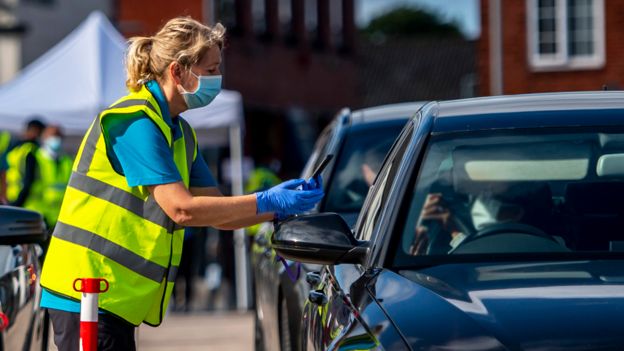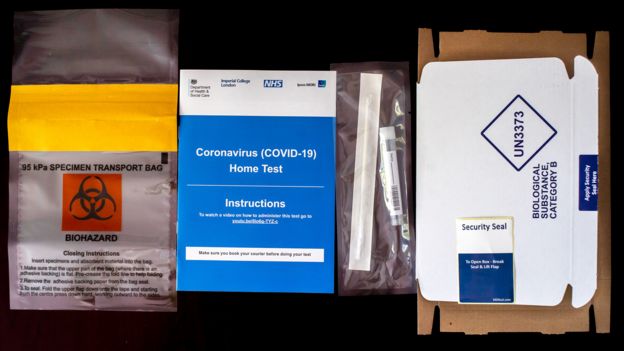What are the tests for coronavirus, who are they for and how do they work?
An increase in demand for coronavirus tests has led to local shortages - with some people being directed to test sites hundreds of miles from their homes.
Testing people and then tracing the contacts of those infected is considered vital to stop the disease from spreading.
Should I get tested?
Anyone showing any of the three key symptoms of coronavirus should be able to be tested. The symptoms are:
* a fever
* a new continuous cough
* a loss of smell or taste
The idea of testing is to find people with the virus and keep them isolated to avoid it being spread through the wider community.
What are the Covid tests?
There are two types of tests.
The first checks if you are currently infected. A nose and throat swab is taken and then sent off to be processed at a lab.
New versions promising to deliver results in 90 minutes are being introduced in hospitals and care homes, where they can be processed using portable machines. But they're not yet widely available.
Tests on saliva are also being trialled, with samples analysed by laboratories.
The second test involves blood samples and looks for antibodies which indicate past, rather than current, infection.
At the moment, these are mainly being used by scientists to estimate what percentage of the population has had Covid, rather than to diagnose individuals.
How do I book a test to check if I have coronavirus?
The testing system has been experiencing a number of problems and many people have struggled to book.
The government maintains anyone with symptoms should still apply for one.
Until you can get a test it's important you and your household self-isolate.
How to get tested:
* Go online, or call 119, before going to a drive-through or walk-through testing site - or a mobile testing unit. But people have faced long waits on the phone and have struggled to book online
* Order a home testing kit in the first four days of having symptoms - although some home kits are not being made available to clear backlogs in laboratories

The Department of Health and Social Care has indicated lab capacity is the reason people have been unable to book tests in recent days.
Testing sites across the the UK:
* 236 mobile units
* 74 drive-through sites
* 58 walk-through sites
* 21 satellite sites (for specific groups - such as health workers)
There are 389 testing centres in total. The aim is to have 500.
How many tests are being carried out?
Figures available reveal testing capacity and the number of actual tests being done. They also show the extent of antibody testing and those tests used by scientists to estimate how widespread the virus is.
* About 220,000 individual tests are actually being processed each day
* Individual testing capacity (excluding antibody tests and virus spread testing) is about 245,000 a day
* 375,000 is the total current UK laboratory daily testing capacity (including antibody tests and virus spread testing)
* The UK government wants laboratory capacity to be 500,000 a day by 31 October
The government has pledged to bring in mass coronavirus testing by the end of the year, even among people with no symptoms.
The prime minister has spoken of his desire for 10 million Covid-19 tests a day by early 2021 - including some that give results in minutes. But experts warn laboratory capacity is an issue - and the technology for more rapid testing does not yet exist.
Can I be tested if I have no symptoms?
Generally only people with symptoms should apply for a test, with results expected within 48 hours.
However, staff and residents in care homes should now be receiving regular tests, regardless of symptoms. Some hospital staff are routinely tested, but there is no national guidance stating they must be.
If you don't have symptoms, the government says you should not apply for a test - unless you are living in a local lockdown area.
How reliable are the tests?
With the most common type of diagnostic test, scientists at the University of Bristol believe 20% of positive cases could falsely appear as negative - wrongly telling someone they are not infected.
This can be because the swab sample wasn't good enough, there were problems in the lab, or because of the stage of infection the patient was at when tested.

How does the UK compare to other countries?
Each country records testing slightly differently, so like for like comparisons won't be 100% accurate.
However, analysis from Our World In Data, a research team based at the University of Oxford, suggests the UK is now performing more tests than many other countries.
For example, the seven-day average up until 10 September showed the UK had carried out 2.8 tests per 1,000 people. This was ahead of European countries including France (2.1) and Spain and Germany (both 1.8).















